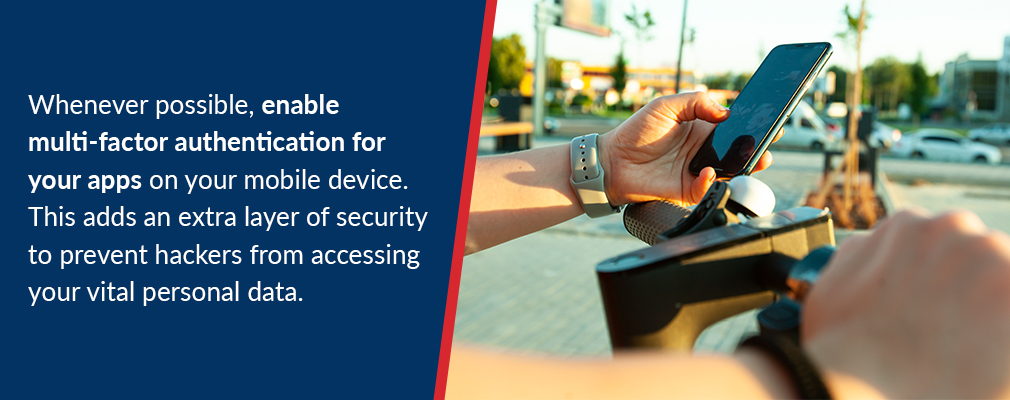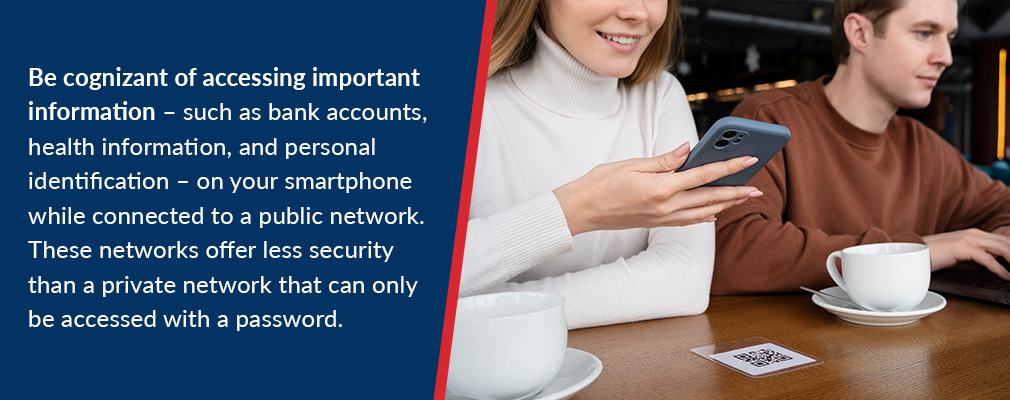For many of us, our cell phones are within reach at almost every waking minute of the day. Our lives are centered around these small devices, whether we’re checking in on work emails, ordering groceries, or moving money around in our online banking app.
But with so much of our personal information now being held on our devices, there also comes a significant security risk. Hackers know that your phone is a goldmine of data, so what can you do to stay protected? Let’s take a look.

Implement two-factor authentication for critical apps
Having a strong password is no longer enough to keep your data safe. Wherever possible, you should set up two-factor authentication on your apps. This extra step may feel unnecessary in many cases, but it’s an extra layer of protection against hackers if they manage to get past the initial login screen.
Two-factor authentication is particularly important for anything that holds your financial information, like banking or investment apps. This data is one of the biggest targets for hackers and scammers, so you need to do everything you can to keep this information private and safe.
Avoid unsecured wi-fi networks
An unsecured wi-fi network is one that doesn’t need a username or password for connection. They’re the ones that you’re most likely to use when you’re outside your home, like at a coffee shop, airport, or local library.
These networks can be convenient to use when you’re in public spaces, particularly if you don’t have the best phone signal. But they’re also one of the easiest ways for hackers to gain access to your device.
Always be aware of what network your phone is connected to and try to avoid online shopping or using your banking apps when on these networks. If you need to access these, try using a VPN instead to mask your network connection to any potential scammers.
Beware of email and text phishing
Links in both emails and text messages are two of the most common ways that hackers gain access to smartphones. If you receive a text message or email that looks suspicious or comes from an unrecognized source, never click on the links inside until you can verify that they’re legitimate.
You may be familiar with this best practice on your computer and know that these links can install malware or spyware on your device. But these days, the same can happen on phones too. You could easily find yourself installing spam software on your device or going to a convincing website that encourages you to hand over your personal information.
Avoid common security mistakes
Having strong passwords is one of the best ways to prevent hackers from accessing your phone, and that goes for your lock screen too!
Avoid using obvious numbers like 1111 or 1234, or something that you’re using in a secure setting like your card pin number. If your device allows you to do so, set up biometric authentication like a fingerprint unlock or facial recognition.
Only use official apps downloaded from app stores
Some businesses or websites that you frequently use may have an app that you can download onto your phone to access their products and services. Although most have these listed and linked on their websites, it’s best to avoid these direct downloads and, instead, find the app within the official app store for your device.
Links online can be easily edited and manipulated by hackers to give them backdoor access to your device through fraudulent apps. Once the app is installed, scammers can then read and copy your personal data and passwords. However, apps within the app store are verified and have been through security measures in order to be listed, so downloading from there should be fine.
Keep your banking and personal data safe
At American National Bank & Trust Company, we’re here to help you keep your personal information protected. If you suspect any fraudulent activity in your account, contact our local branch teams straight away to lockdown your cards. You can also contact our fraud department at 1.800.237.8990.


